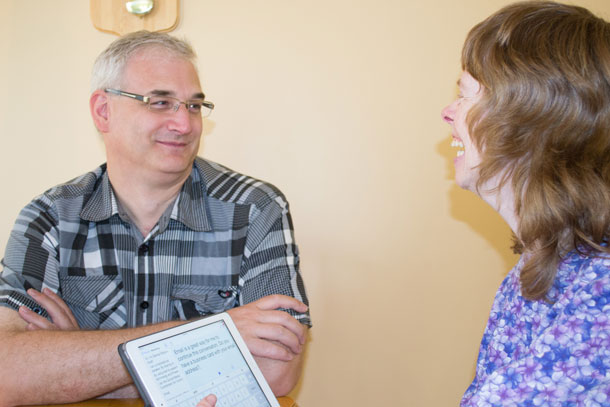Living with a significant speech impairment means communicating can be frustrating and, oftentimes, cause miscommunication. For this reason, I am selective in what businesses and stores I patronize. However, I do not have that same latitude when it comes to healthcare. I must deal with healthcare professionals as they come, and frankly, many of these professionals appear clueless when interacting with an individual with a speech impairment.
One of many examples is an appointment with a rehabilitation specialist. The doctor told me he would ask me questions, but my husband Darrell (see Figure 1) should respond because “it would be faster.” I was shocked! This was after he spent several minutes chitchatting about what Darrell did for a living—completely unrelated to my appointment.

The specialist expected my husband to speak for me on something as important as my health because he didn’t want to take the time to have Darrell translate what I was saying. He didn’t want to bother attempting to understand my speech pattern either, which is possible with patience applied. Darrell and I proceeded as we typically do: questions were asked, I responded, and Darrell translated where needed. Allowing extra time for effective communication would have been beneficial in this case.
On another occasion, I was at the Emergency Department because of a badly-injured foot. The nurse indicated for Darrell, who also uses a wheelchair, to return to the waiting room because there wasn’t enough space for both power wheelchairs. Hospitals designed with enough space to accommodate people in wheelchairs would absolutely aid in the quality of care received.
Darrell explained that I needed him for communication purposes. But once he relayed how the injury occurred and other necessary medical details, he was again told to leave. The nurse assured him that she would come get him as needed, although none of the other patients’ companions were required to leave.
In that moment I knew my patient rights were being denied. Patients who are deaf wouldn’t (or shouldn’t) be denied access to an interpreter. Non-English speaking patients requiring a translator would also not be denied one.;Yet, I, with a significant speech impairment, was denied my means of communication. Darrell handed me my iPad before leaving, but I wasn’t sure I could coherently type, I was in so much pain.
In this instance, I suffered from only an injured foot. What if it had been serious or even life threatening? Would I have been denied my means of communication?
I am not alone. According to Communication Disabilities Access Canada, “440,000 Canadians have speech and language disabilities that are not caused by hearing loss.” These Canadians might have cerebral palsy, autism, cognitive disability, traumatic brain injury, aphasia after a stroke, dementia, Amyotrophic Lateral Sclerosis (Lou Gehrig’s Disease), Parkinson’s Disease, Multiple Sclerosis, or other conditions.
I wish that healthcare professionals would not assume that I am hearing or cognitively impaired simply because they cannot understand my speech. I do hear and understand them even if they don’t understand me. If they are unsure of something, I don’t mind if they ask.
Communication is critical in healthcare. When people are denied the opportunity to communicate in the most effective means possible for them, serious consequences can result. Happily, much can be done to enable patients to communicate as effectively as possible in the moment.
For patients who have existing communication methods in place, use them. This might mean enabling patients to use their own devices, boards, or other communication systems, or ensuring that a communication assistant is present.
For patients who have recently loss their ability to speak, for instance from a stroke or an injury requiring intubation, providing essential healthcare-based picture or alphabet boards, pen and paper, and other communication tools should be standard procedure.
On another trip to the ER, after the triage nurse asked several unrelated questions (including how I grocery shop and shower, even though I presented myself in a fairly well-fed and kept manner), she returned to the registration desk where other nurses had gathered. It was obvious she was gossiping about me; one nurse closed the door when she realized I could hear them. I felt disrespected and violated; humiliated. Why was the same confidentiality not afforded to me as to other patients?
As with any patient, those with speech and language disabilities must be treated with respect and dignity while maintaining confidentiality. If you speak in front of them or anyplace nearby, assume they can hear and understand you because, often, they can.
I implore you to share my experiences with the doctors, nurses, and healthcare professionals you know. Your action in doing so might provide a patient with a way to communicate to indicate pain, eliminate a misdiagnosis, or save a life.
More reading
交流在健康保健中的作用至关重要。但专业健康保健人员往往对如何与有语言障碍的患者进行交互知之甚少。对于这部分患者而言,看诊可能是件受挫的事,尤其是当他们不能使用自己的通信设备或通信辅助工具交流时。他们必须费力地说明问题,指出病痛,纠正误解,甚至拯救自己的生命,因此后果可能很严重。 文章全文为英文版
의료에 있어서 소통은 대단히 중요합니다. 그러나 의료전문가들은 종종 언어장애가 있는 사람과 상호작용하는 방법을 잘 모릅니다. 그런 환자들로서는 의사에게 가는 것이, 특히 그들이 사용하는 의사소통 기기나 의사소통 보조장치를 사용할 수 없을 때는 불만스러울 수가 있습니다. 문제점을 설명하거나 통증을 표현하고, 오해를 바로잡거나 심지어 생명을 구하기 위해 애를 쓰다 보면 그 결과가 심각할 수도 있습니다. 전체 기사는 영어로만 제공됩니다.
A comunicação é essencial em serviços de saúde. Em geral, porém, os profissionais de saúde não fazem ideia de como interagir com um indivíduo com distúrbio da fala. Para esses pacientes, uma consulta médica pode ser frustrante, principalmente quando não conseguem usar os próprios dispositivos de comunicação ou um assistente de comunicação. Os resultados podem ser graves quando se esforçam para explicar o problema, indicar a dor, corrigir um mal-entendido ou até mesmo para salvar a vida do paciente. O artigo completo está disponível somente em inglês.
医療においてコミュニケーションは不可欠なものである。しかし、言語障害を持つ患者と意思の疎通をする方法についてほとんど知識を持たない医療従事者がかなりいる。このような患者にとり、医師の診察を受けることは、特に自分のコミュニケーション用デバイスや補助器を使うことができない場合、ストレスとなりやすい。患者は、問題を説明し、痛む場所を示し、医師による誤解を正したり、あるいはこういったことを経て自分の命を守ろうとして苦労し、深刻な結果にいたることがある。 原文は英語だけになります
La comunicación es fundamental en la atención médica. Pero los profesionales de atención médica pocas veces saben cómo interactuar con un individuo con una discapacidad del habla. Para esos pacientes, una visita al médico puede ser frustrante, en especial cuando no pueden usar sus propios dispositivos de comunicación o un asistente para comunicarse. Los resultados pueden ser graves cuando pugnan por explicar un problema, indicar dolor, corregir un malentendido o incluso salvar su vida. La versión completa de este artículo está sólo disponible en inglés
